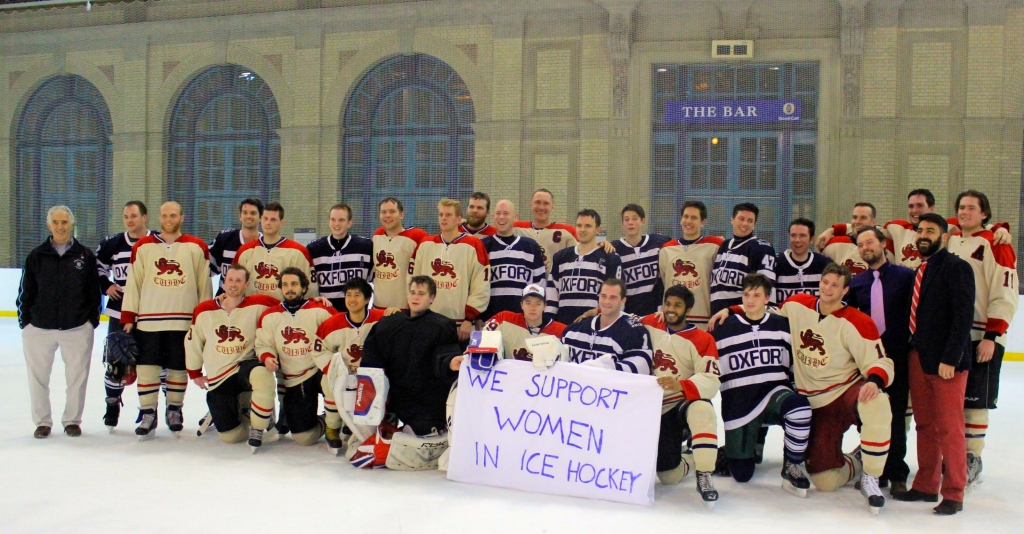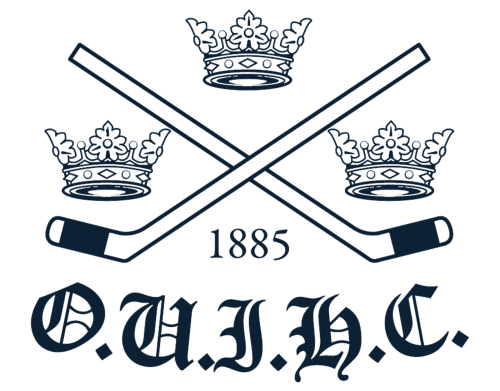
Standing behind the OUIHC booth at fresher’s fair for both the University of Oxford and Brookes University, I was approached by a number of people who were surprised to see us there. “Ice hockey?! There’s a team?!” was a common reaction among the passers-by and enthusiastic students. While it is true that the UK is not necessarily one of the first places one associates with ice hockey, the sport has a deep and rich history here, much of it emerging from Oxford University and its students. In response to those surprised students, I quickly mentioned that yes, there is a team – in fact there are 3 teams that make up the OUIHC, the second oldest hockey club in the world.
For others, however, playing ice hockey was a strange proposition approached with caution. Especially for women, many students assumed that it was a men’s sport that is violent and dangerous. When I mentioned the women’s team, so many were truly surprised and amazed. A few keen people were intrigued (some of which are now devoted members of the club). In fact, women’s ice hockey is one of the fastest growing sports in the world, with much of that growth taking place here in the UK. The OUIHC Women’s Blues are proud to be a part of that growth and a part of the history of women’s ice hockey nation-wide.
The OUIHC Women’s Blues were formed in 1981/1982 and were among the first four teams in the British Women’s League founded in 1984. Over the years, we have won several titles, but this year has been exceptional.
Playing in the British University Ice Hockey Association’s (BUIHA) league, we compete against men (and a few other women) in non-checking hockey. For many of those prospective female players at our recruitment booth before the season had even begun, this seemed intimidating and, for some, perplexing. Little did anyone know that we would dominate our division and go on to make history at the National Championships by placing third with only 6 skaters in the final semi-final match. We don’t play “women’s hockey”, we are women who play non-checking ice hockey, alongside men’s and mixed teams. The OUIHC Women’s Blues are not just good ‘for a women’s team’, but we are one of the top teams playing non-checking hockey – period.

Still, as one of the very few all-women’s teams in the BUIHA at any level, we have received mixed responses from other teams and fans over the years. In the past, we had been ‘written off’ by game predictions made by the BUIHA, and we’ve been ridiculed for being ‘an easy win’ by opposing teams (innuendo abound, to our disgust). In the particular match that these insults were flung, based purely on our gender, I am very pleased to report that we destroyed the opposing team 8-0 – the inverse score predicted. This year at Nationals, one of our fans overheard a gentleman in the crowd exclaim that there was no way we would win, again on the basis of our gender. We won that match with only 7 skaters, dominating the game despite the close score.
While it can be difficult playing a male dominated sport, achievements are deeply rewarding and work to improve the reputation of the sport beyond just our league. This year, we are incredibly proud to say that we are the best women’s university team in the UK, beating Cambridge and playing above the Newcastle Wildcats. But it is difficult, especially when we face deeply engrained sexism that is, unfortunately, a part of many team cultures in the sporting world. This fuels us to persist and to be the best we can be, playing the sport we all love. In recent years, we’ve done this with the support of the OUIHC men’s teams who have helped on the ice and off, and who respect us as hockey players and people (a mutual sentiment!).

As we look forward to the 2015-2016 season, we are filled with excitement. We’ve come a long way and have made massive strides, year-over-year. We pride ourselves on our commitment to the sport and our role in developing ice hockey nation-wide through our development camp. Our annual camp is open to all female hockey players in the BUIHA, and in 2016, we hope to secure a coach who has experience playing women’s hockey at the national level. While the camp is beneficial for the development of our own team, it is also an important opportunity to develop women’s hockey and a supportive community of women’s ice hockey players across the country.
When recruitment begins and our stall at the fresher’s fairs set up again, I will be behind the table once more looking for recruits for both the men’s and women’s teams. While I’m not sure if ice hockey will ever become as popular here at Oxford as it is in other places, especially in North America, I do hope that one day soon, people will cease to be surprised that women play this ‘men’s’ sport. We play – and we’re damn good.
